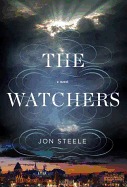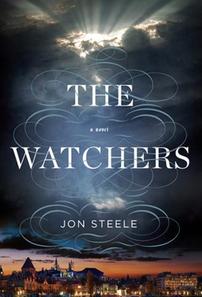
 Marc Rochat is a slightly disabled young man who spends his evenings in the tower of a cathedral in Lausanne, Switzerland. He bears a heavy responsibility: "This is the last good place in a world of terrible sadness," his predecessor explains to him. "You must never fail to call the hour, you must always protect the bells and call the hour." And if he happens to engage the bells in conversation while he's guarding them, well, anyone can see he's a true innocent--a little slow, maybe (or maybe not), but sweet and harmless.
Marc Rochat is a slightly disabled young man who spends his evenings in the tower of a cathedral in Lausanne, Switzerland. He bears a heavy responsibility: "This is the last good place in a world of terrible sadness," his predecessor explains to him. "You must never fail to call the hour, you must always protect the bells and call the hour." And if he happens to engage the bells in conversation while he's guarding them, well, anyone can see he's a true innocent--a little slow, maybe (or maybe not), but sweet and harmless.
Rochat is the emotional center of Jon Steele's debut novel, The Watchers, and his intimate connection to Lausanne Cathedral is driven home in one scene after another. It won't take you long to figure out that Rochat has been groomed for his postion as le guet--"the watchman," loosely translated--but by whom, and for what purpose?
Naturally, it has something to do with the other two people who are drawn to the cathedral: Katherine Taylor, a call girl on retainer to some of the world's wealthiest men, and Jay Harper, a British detective in the classic rumpled knight errant mold who--for some reason--can't remember much about his life before he showed up in Lausanne but is capable of quoting poetry off the top of his head. Stock characters straight from the bin, sure, and it doesn't help that both of them share Rochat's habit of talking out loud to themselves. (For one character, it might be a useful expository trick, but with all three characters doing it, it becomes a distracting affectation on Steele's part.)
Emotional depth isn't really the point, though. The characters' primary function is in service of Steele's big narrative idea, which veers deep into Dan Brown territory by way of the apocryphal Book of Enoch, an ancient text describing a race of rebellious angels who consorted with human women, creating the half-breeds of the Nephilim. Steele plunges wholeheartedly into this mythology, infusing it with modern permutations--with Harper's hard-boiled skepticism a mirror for readers' own likely reluctance to suspend disbelief. From the moment he first sees her, Rochat is convinced Katherine is a "lost angel," and not just metaphorically. One of the questions propelling The Watchers towards its climatic showdown is: How right is he? Steele teases his answers out slowly at first--perhaps a bit too slowly for some readers' tastes--but once he's got everything lined up the way he wants it, the final act is pure blockbuster. --Ron Hogan
Shelf Talker: Jon Steele's take on the alternative theological thriller blends the legends of a suppressed ancient text with pulp noir archetypes and a sweet but simple man on the side of the angels.

